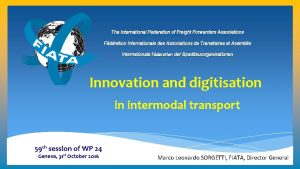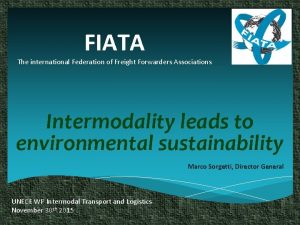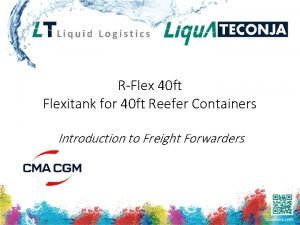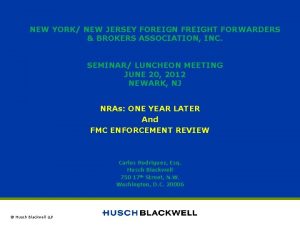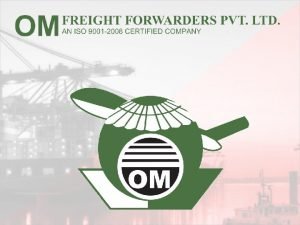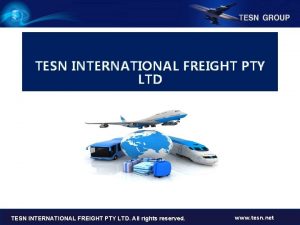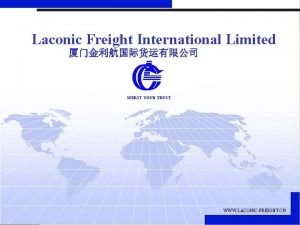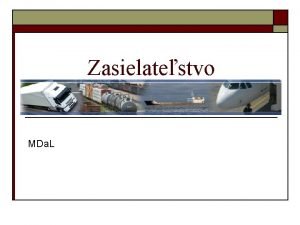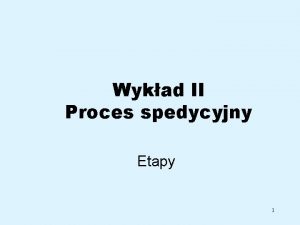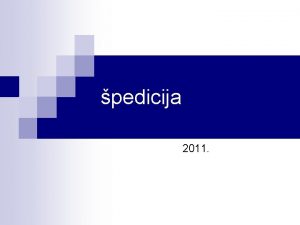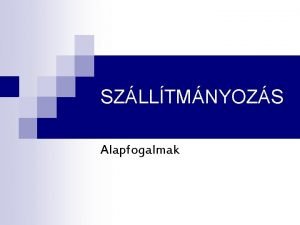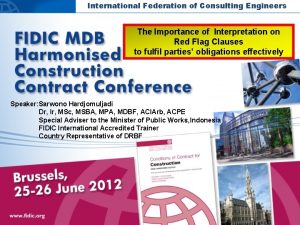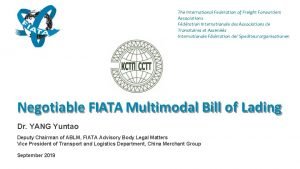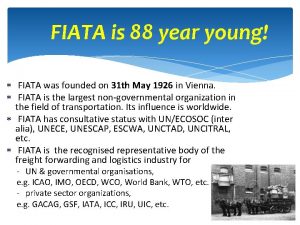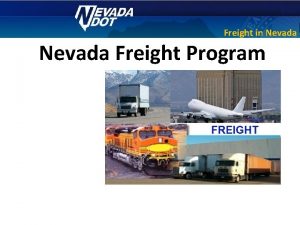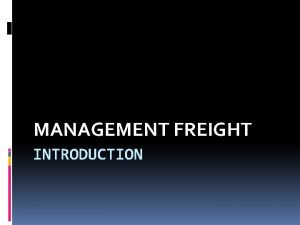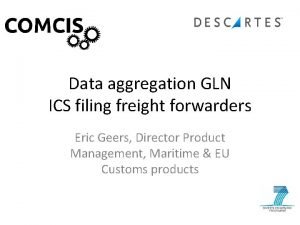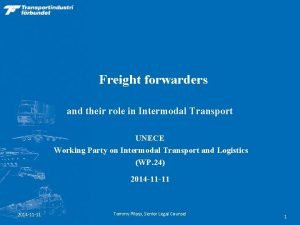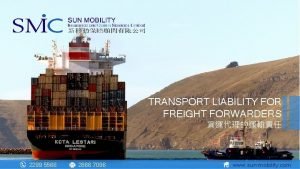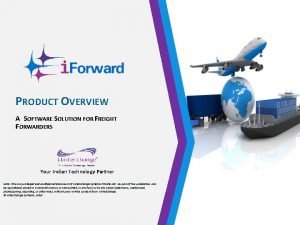FIATA The international Federation of Freight Forwarders Associations












- Slides: 12

FIATA The international Federation of Freight Forwarders Associations Intermodality leads to environmental sustainability Marco Sorgetti, Director General UNECE WP Intermodal Transport and Logistics November 30 th 2015

89 years of FIATA Founded in 1926 in Vienna International non-governmental organisation representing freight forwarders and logistics service providers in international trade logistics and supply chain management in all modes of transport Represents 111 Association Members in 100 countries / 5492 direct Individual Members in 160 countries with +/- 40, 000 members (Sep 2015 data) – all types of business 1000, 10 or only 1 stations… Worldwide influence in logistics and trade facilitation through standard setting, good practice, training and cooperation with 2 international institutions.

The value provided • “Freight Forwarding and Logistic Services" means services of any kind relating to the carriage (performed by single mode or multimodal transport means), consolidation, storage, handling, packing or distribution of the Goods as well as ancillary and advisory services in connection therewith, including but not limited to customs and fiscal matters, declaring the Goods for official purposes, procuring insurance of the Goods and collecting or procuring payment or documents relating to the Goods. Freight Forwarding Services also include logistical services with modern information and communication technology in connection with the carriage, handling or storage of the Goods, and de facto total supply chain management. These services can be tailored to meet the flexible application of the services provided. 3

Cooperation led by shippers Shippers own trade and command logistics services Shippers could help achieve a new SUSTAINABILITY covenant on 4 pillars - International Standards on measured emissions agreed Recognised and harmonised measures applicable globally Shared responsibilities Early adoption of innovative technology The “agent” approach is outdated, most business is principal today and this attracts new rights and new duties into forwarders’ due diligence à FF need investments in logistics connectivity and trade facilitation to meet customers’ demands 4

Shared responsibilities Freight forwarders are at shippers’ service with expertise, information and organisation, helping them to uphold compliance & sustainability, but sustainability is the result of the collaboration of all the stakeholders in the supply chain, all SC stakeholders are called to action Freight forwarders may help increase awareness and show preference for more sustainable systems if they show comparable W 2 W costs à FF industry is working to improve knowledge of, and adherence to sustainability objective and are naturally mode-neutral when making choices of transport mode FIATA is are ready to cooperate in training and best practice through the FIATA 5 LOGISTICS ACADEMY www. fiatalearning. com

SDG key statements from: The value of the good is only expected until it reaches the consumer, logistics connectivity is key to sustainable trade Taxation, financial incentives, regulations, liberalisation…FIATA promote investment in logistics connectivity, investments for ROI, not just costs. Benefiting from seamless border procedures through greater trade facilitation affords important savings both economically and environmentally Reliable, harmonised measuring systems for emissions should ensure transparency and equitability of all measures adopted by governments

FIATA’s Awareness Drive FIATA provides assistance by publishing circulars & news on multimodal and intermodal issues, assists members with information to make sustainable modal choices and privileges sustainable solutions among comparable service performance indicators. FIATA Encourages Members to: Remain apprised of sustainable mobility information and sustainability challenges Inform customers, businesses and the public at large on intermodal solutions Use multimodal documents, in particular FIATA documents whenever appropriate Develop sustainability compliant business plans with clear measurements Consult with FIATA’s Multimodal Transport Institute in case of need 7

FIATA multimodal Products Transport Documents FIATA Standard Documents FBL, FCR, FCT, FWR and more DG and weight declarations FIATA going “digitalistic”…. Advisory Body Information Technology (ABIT) FIATA e-FBL platform through ess. DOCS Mercury. Gate Platform tailored to SMEs Mo. U Endorsing IATA’s e. AWB and transition to paperless 8

Digital (r)evolution? Global (? ) standards and IT, a dichotomy? Global standards, the role of UNCEFACT & WCO Industry standards such as FBL, IATA e. Freight, etc. Transfer of electronic records (Group IV) work at UNCITRAL sees a role for IT regulated service providers – maybe we need IT intermediaries? E. G. Regional IT approach, the EU DTLF Working towards one digital EU Market ? Data Trust for document Recognition The main problem is to find “the digital logistics customer”.

Moving Forward Sustainability is a challenge for logistics and supply chain management but it is an opportunity to be embraced, cooperating without fear (VOLVO Sustainability Forum conclusions. National Policy Measures should focus on logistics connectivity investments allowing freedom of modal choice, fostering improved performance for all modes of transport, not fostering modal shift horsetrading. The role of enhanced technology becomes more crucial and migration to totally paperless logistics might make sustainability easier to achieve. Regulation of freight forwarders’ services is not useful, sustainability in the Supply Chain must be a shared objective, not a fetter to evolution and improvement.

The FWC will be about “smart” logistics

Thank you!
 International federation of freight forwarders associations
International federation of freight forwarders associations International federation of freight forwarders associations
International federation of freight forwarders associations Flexitank forwarders
Flexitank forwarders Ny nj foreign freight forwarders
Ny nj foreign freight forwarders Om freight forwarders
Om freight forwarders Tesn
Tesn Laconic freight international ltd
Laconic freight international ltd Konosament fiata
Konosament fiata Fiata fwb
Fiata fwb Fiata fct
Fiata fct Fiata sdt
Fiata sdt International federation of pharmaceutical manufacturers
International federation of pharmaceutical manufacturers Occurenced
Occurenced
